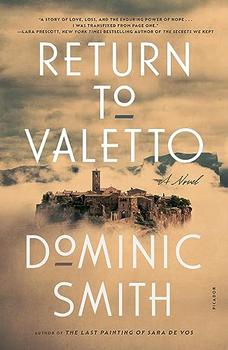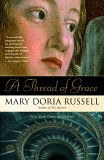Summary | Excerpt | Reviews | Beyond the book | Read-Alikes | Genres & Themes | Author Bio

A Novel
by Dominic SmithDominic Smith's novel Return to Valetto is narrated by Hugh Fisher, an author and historian. In the book's opening chapter we learn Hugh's wife died of cancer six years prior, and his mother followed not long afterwards; he's been unable to move on with his life, still mourning these losses. While on a lecture tour in Italy he decides to spend time in his mother's birthplace, Valetto, a tiny village situated on a crumbling plateau in the country's central region. Among the town's 10 remaining residents are his three elderly aunts and his grandmother, who is within weeks of celebrating her 100th birthday. He plans to stay in a cottage behind their villa that he inherited from his mother, but he finds the house has recently been occupied by a squatter. Elisa Tomassi claims Hugh's grandfather (who left his wife and four daughters to join the World War II Italian resistance and was never heard from again) gave her family the cottage to thank them for hiding and protecting him during the waning days of the war. As Hugh seeks to sort out the cottage's true ownership, he and Elisa uncover evidence of a long-ago trauma that impacted each of their families in unexpected ways.
People who read extensively often feel like they can anticipate what direction a novel's plot is likely to take, and I confess I'm guilty of this myself. I was delightfully surprised, therefore, when the book's storyline developed in an unpredictable direction. The revelation of the trauma itself, while pivotal, is brief, and comes earlier in the book than one might assume. The author uses the event to examine complex themes such as how the effects of trauma spread beyond its immediate victims and what actions against the perpetrators, if any, will heal those impacted. In other words, the book's main thrust isn't the revelation of a family secret, it's what one does with the knowledge once that secret is revealed. The theme of abandonment also permeates the narrative, raising empathy for the many damaged characters who appear throughout the novel and hope for their ultimate happiness.
Smith's descriptions of the Italian countryside and the town of Valetto are absolutely sumptuous, and so vivid the setting practically becomes a character in its own right. The lush prose transported me, almost making me feel I was enjoying a vacation in central Italy:
And then we were driving out toward Valetto in early November sunshine. The blacktop curled between straw-colored fields, the farmhouses shuttered and set back amid stone pines and woodpiles, the church spires and bell towers of small towns flip-booking through the bare-limbed trees along the roadway.
This is writing to be savored, with each brilliantly crafted paragraph an ode to central Italy, and the author's love of it apparent on every page.
He is also especially adept at character development. The novel is peppered with secondary characters who make brief appearances, but each one is remarkably three-dimensional. Smith skillfully avoids the trap of distinguishing his creations with quirkiness, instead focusing on penning them as true-to-life as possible; the result is masterful.
My only complaint with the work is that all the beautifully descriptive narration slows the book's pace considerably. It wasn't a slog, exactly; I was never bored or tempted to abandon it, and I did frequently pause to revel in the author's exquisite technique. But I hit the 30% mark wondering if the plot would ever show some movement. The pacing improves about midway through the book, but some readers may need patience to get to that point. It's without doubt worth the effort; I ended up completely enjoying the novel, and I feel that those who persist will likely be glad they did.
Return to Valetto is a marvelous work of literary fiction, and I recommend it for anyone looking for a well-written novel they can relax into. The author's exploration of complex themes makes this one a winner.
![]() This review was originally published in The BookBrowse Review in July 2023, and has been updated for the
July 2024 edition.
Click here to go to this issue.
This review was originally published in The BookBrowse Review in July 2023, and has been updated for the
July 2024 edition.
Click here to go to this issue.

If you liked Return to Valetto, try these:

by Paolo Giordano
Published 2011
A bestselling international literary sensation about whether a "prime number" can ever truly connect with someone else.

by Mary Doria Russell
Published 2005
Set in Italy during the dramatic finale of World War II, Russell's ambitious and engrossing novel tells the little known story of how Italian citizens saved more than 43,000 Jews during the last 20 months of WWII.
Your guide toexceptional books
BookBrowse seeks out and recommends the best in contemporary fiction and nonfiction—books that not only engage and entertain but also deepen our understanding of ourselves and the world around us.